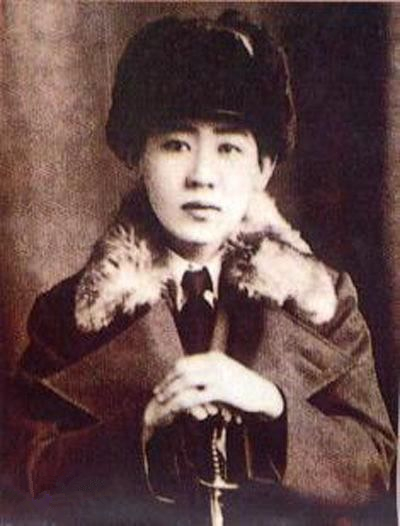公主还是间谍:谜一般的川岛芳子

‘Manchu Princess, Japanese Spy,’ by Phyllis Birnbaum
公主还是间谍:谜一般的川岛芳子
Yoshiko Kawashima was, at first glance, a winning figure. Described by The New York Times in 1933 as “a picturesque film-drama figure, half tomboy, half heroine,” she was often called the “Joan of Arc of the Manchus.” It was the fulfillment of a childhood dream. Riding to school on horseback, Kawashima imagined herself as a new Joan, restoring her people to their rightful glory.
川岛芳子乍看上去是个迷人的人物。在1933年的《纽约时报》上,说她是“奇特的电影式戏剧化人物,半是假小子,半是女英雄”,经常被人称为“满族的圣女贞德”。这也是她的童年梦想——儿时骑马上学的时候,川岛就经常幻想自己像贞德那样,领导人民赢回应有的光荣。
She was born in China in 1907, the daughter of a Manchu prince with 38 children and frustrated dreams of reviving the Qing dynasty. As a reward to one of his Japanese allies, Naniwa Kawashima, Prince Su sent him a child — Aisin Gioro Xianyu, now renamed Yoshiko Kawashima, who was likely just 8 years old when she left for Japan.
1907年,川岛芳子生于中国,是一位不得志的满族亲王的女儿,她父亲有38个子女,怀有复兴清王朝的梦想。为了报答来自日本的支持者川岛浪速,这位肃亲王把8岁的女儿爱新觉罗·显玗送给他做养女,她改名川岛芳子,随养父去了日本。
Yoshiko’s adoptive father encouraged her warrior bravado and her tendency toward exaggeration. During the Boxer Rebellion, he claimed to have single-handedly rescued the imperial family. But Naniwa was also short-tempered, known for running after his daughter with a shovel. And she was subjected to a hellish series of suitors, drawn from the ultranationalists who surrounded him. At last Yoshiko rebelled, cutting off her hair. “I decided to cease being a woman forever,” she announced. As Phyllis Birnbaum reports in “Manchu Princess, Japanese Spy,” it was the first of many attempts to shape her own image, and her fate.
养父鼓励她身上武士的勇敢精神,以及喜欢夸张的倾向。他声称自己在义和拳运动中单枪匹马地拯救了皇室家族。但川岛浪速脾气暴躁,曾经提着铲子追赶自己的女儿。芳子有大量追求者,都是围绕在浪速身边的极端民族主义者。最后叛逆的芳子剪掉了自己的头发,宣布,“我永远清算了女性”。菲利斯·伯恩鲍姆 (Phyllis Birnbaum)在《满族公主,日本间谍》(Manchu Princess, Japanese Spy)一书中写道,芳子一生多次试图改变自己的形象与命运,这仅仅是第一次而已。
In 1931, Yoshiko was hired by the Japanese Kwantung Army, which was intent on creating a Manchurian “paradise of benevolent government,” the puppet state of Manchukuo. “The job description,” Birnbaum writes, “was hazy.” Yoshiko may have driven cross-country with Empress Wanrong stowed in the trunk of her car. She may have incited the Shanghai Incident of 1932, led troops at the disastrous Battle of Rehe and flown into Manchukuo to confront a rebellious warlord and free his captives.
1931年,日本关东军想在东北建立所谓的“王道乐土”,即满洲国傀儡政权,他们雇佣了芳子。伯恩鲍姆写道,“她的工作内容并不明确”。芳子很可能把婉容皇后藏在自己汽车的后备箱里穿越满洲国。她可能引发了1932年的上海事变,可能在伤亡惨重的热河战役中率领军队,乘飞机来到满洲国与一个反叛的军阀对峙,并释放了他的俘虏。
She may have, but probably didn’t. Yoshiko’s wartime experiences were filtered through the work of the Japanese novelist Shofu Muramatsu, who “improved” his best-selling 1933 portrait of her, “The Beauty in Men’s Clothing,” with a few undercover assignments. Muramatsu called the result a collaboration. Later, the Nationalist government would accuse Yoshiko of the same crime.
她可能做了以上这些事情,也可能没有——芳子的战时经历经过日本小说家村松梢风的加工,1933年,他创作了她的传记《男装丽人》(The Beauty in Men’s Clothing),其中写到她从事的若干秘密任务,并“改进”了她的形象,这本书成了畅销书。村松梢风说这本书是两人合作的产物。后来,国民党政府也以同样的罪名起诉她。
“My whole life has been formed by false gossip about me,” her prison confession begins, “and I will die because of false gossip against me.” But Yoshiko herself seized every opportunity for aggrandizement. In a typical encounter, she described herself as the last emperor’s daughter, dressed in drag to outsmart assassins. Her parents were killed, her brothers gruesomely dispatched. She was a pilot, an expert shot, a painter, a poet. Her listener believed, and transcribed, every word.
“我的整个一生都建筑在虚假的谣言上,”她的狱中自白这样开头,“如今我也将死于这些虚假的谣言。”但是她也不放过任何夸大其词的机会。在一次特别典型的聊天中,她说自己是末代皇帝的女儿,穿男装是为了逃过暗杀。她的父母被杀害、兄弟被残忍地处决,她是飞行员、神枪手、画家和诗人。和她聊天的人相信了她的话,并且逐字记录下来。
“This star-struck remembrance,” Birnbaum writes, “must bring despair to the heart of any biographer.” Birnbaum’s previous work has featured flamboyant, self-made characters — one of her subjects, the painter Foujita, wrestled movingly with his Eastern and Western identities — but never someone whose life was so strongly a product of her own imagination. Still, reality eventually made inroads. By the late 1930s, disillusioned with Manchukuo and diminished by opium addiction, Yoshiko began to seem less the Eastern Joan of Arc than the Manchurian Lindsay Lohan. In the end, her closest confidants were four pet monkeys.
“这种追星式的回忆真能让任何传记作者抓狂,”伯恩鲍姆写道,她之前的传记作品中也塑造过华丽浮夸、凭空塑造出自身形象的人物,比如始终在东方与西方身份认同之间艰苦挣扎的画家藤田(Foujita)——但她从来没写过像川岛芳子这样一个整个人生都建立在自己想像之上的人物。现实最终还是要面对。 20世纪30年代末,芳子对满洲国感到幻灭,又深受鸦片烟瘾的折磨,她看上去不再像东方的圣女贞德,倒像是满洲的林赛·罗翰(Lindsay Lohan)。到最后,她最亲近的朋友是四只宠物猴子。
Birnbaum’s book closes with the sad poetic justice of Yoshiko’s trial, when the Nationalist government, relying on films, novels and Yoshiko’s own hyperbolic memoirs, sentenced her to execution. Yoshiko was, Birnbaum notes, “astonished that fiction would pass for evidence.”
伯恩鲍姆的书以芳子在审判中受到了悲哀而应得的惩罚告终——国民党政府根据电影、小说和芳子夸张的回忆录判处她死刑。伯恩鲍姆写道,“小说竟然也能成为证据,芳子感到大为震惊。”
So Yoshiko Kawashima died, at last taken seriously. Or she didn’t. In Birnbaum’s biography, which grasps at but never quite captures Yoshiko’s spirit, her subject emerges as a woman supremely in command of her own fiction, even to the last. On March 25, 1948, Yoshiko was either executed or replaced by a body double and smuggled off to a life in hiding. She’ll always be the one who got away.
于是川岛芳子就这么死了,至少人们认为她死了。但是,也许她没有死。伯恩鲍姆的传记把握住了芳子的精神,但并未能真正捕捉到她的魂魄,这个女人直到生命的最后一刻,都拼命想要塑造自己的虚构故事。根据这本传记,1948年3月25日,芳子不是被处决,就是被替身掉包了,她本人被偷运出去,藏匿起来。她永远都是那个逃逸的人。


















